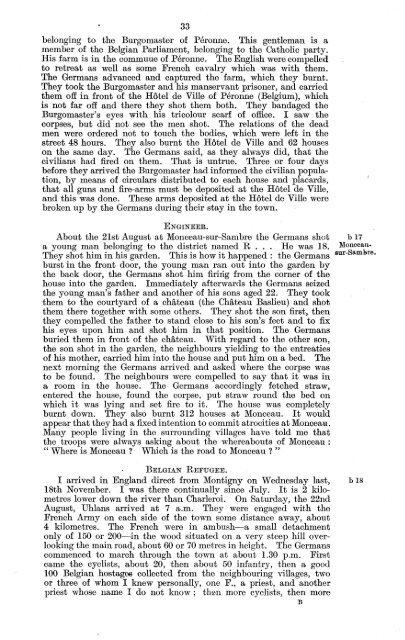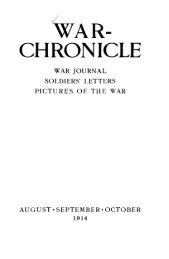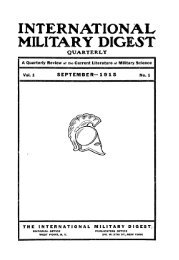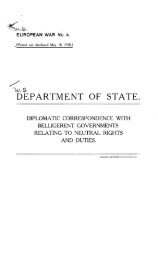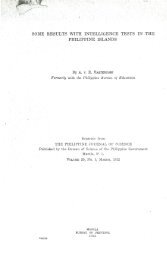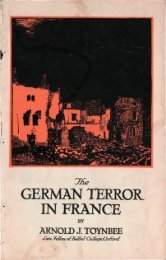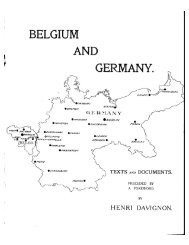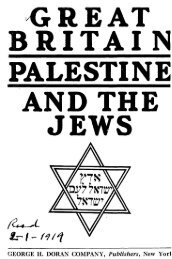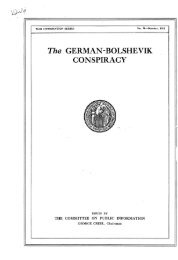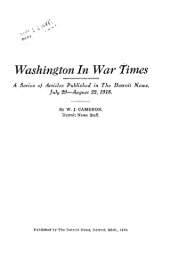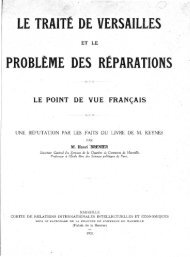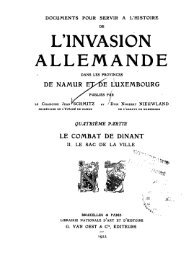ALLEGED GERMAN OUTRAGES
ALLEGED GERMAN OUTRAGES
ALLEGED GERMAN OUTRAGES
You also want an ePaper? Increase the reach of your titles
YUMPU automatically turns print PDFs into web optimized ePapers that Google loves.
33<br />
belonging to the Burgomaster of Peronne. This gentleman is a<br />
member of the Belgian Parliament, belonging to the Catholic party.<br />
His farm is in the commuue of Peronne. The English were compelled<br />
to retreat as well as some French cavalry which was with them.<br />
The Germans advanced and captured the farm, which they burnt.<br />
They took the Burgomaster and his manservant prisoner, and carried<br />
them off in front of the Hotel de Ville of Peronne (Belgium), which<br />
is not far off and there they shot them both. They bandaged the<br />
Burgomaster's eyes with his tricolour scarf of office. I saw the<br />
corpses, but did not see the men shot. The relations of the dead<br />
men were ordered not to touch the bodies, which were left in the<br />
street 48 hours. They also burnt the Hotel de Ville and 62 houses<br />
on the same day. The Germans said, as they always did, that the<br />
civilians had fired on them. That is untrue. Three or four days<br />
before they arrived the Burgomaster had informed the civilian population,<br />
by means of circulars distributed to each house and placards,<br />
that all guns and fire-arms must be deposited at the Hotel de Ville,<br />
and this was done. These arms deposited at the Hotel de Ville were<br />
broken up by the Germans during their stay in the town.<br />
ENGINEER.<br />
About the 21st August at Monceau-sur-Sambre the Germans shot b 17<br />
a young man belonging to the district named R . . . He was 18. Monoeau-<br />
They shot him in his garden. This is how it happened : the Germans g ur-Samfere.<br />
burst in the front door, the young man ran out into the garden by<br />
the back door, the Germans shot him firing from the corner of the<br />
house into the garden. Immediately afterwards the Germans seized<br />
the young man's father and another of his sons aged 22. They took<br />
them to the courtyard of a chateau (the Chateau Baslieu) and shot<br />
them there together with some others. They shot the son first, then<br />
they compelled the father to stand close to his son's feet and to fix<br />
his eyes upon him and shot him in that position. The Germans<br />
buried them in front of the chateau. With regard to the other son,<br />
the son shot in the garden, the neighbours yielding to the entreaties<br />
of his mother, carried him into the house and put him on a bed. The<br />
next morning the Germans arrived and asked where the corpse was<br />
to be found. The neighbours were compelled to say that it was in<br />
a room in the house. The Germans accordingly fetched straw,<br />
entered the house, found the corpse, put straw round the bed on<br />
which it was lying and set fire to it. The house was completely<br />
burnt down. They also burnt 312 houses at Monceau. It would<br />
appear that they had a fixed intention to commit atrocities at Monceam.<br />
Many people living in the surrounding villages have told me that<br />
the troops were always asking about the whereabouts of Monceau :<br />
" Where is Monceau ? Which is the road to Monceau ? "<br />
BELGIAN REFUGEE.<br />
I arrived in England direct from Montigny on Wednesday last, b 18<br />
18th November. I was there continually since July. It is 2 kilometres<br />
lower down the river than Charleroi. On Saturday, the 22nd<br />
August, "Uhlans arrived at 7 a.m. They were engaged with the<br />
French Army on each side of the town some distance away, about<br />
4 kilometres. The French were in ambush—a small detachment<br />
only of 150 or 200—in the wood situated on a very steep hill overlooking<br />
the main road, about 60 or 70 metres in height. The Germans<br />
commenced to march through the town at about 1.30 p.m. First<br />
came the cyclists, about 20, then about 50 infantry, then a good<br />
100 Belgian hostages collected from the neighbouring villages, two<br />
or three of whom I knew personally, one F., a priest, and another<br />
priest whose name I do not know ; then more cyclists, then more<br />
B


